Ready to create more pipeline?
Get a demo and discover why thousands of SDR and Sales teams trust LeadIQ to help them build pipeline confidently.



AI-powered sales tools are flooding the market; to make it easier for you to pick tools for your team, we’ve captured highlights from 10 of the best AI sales tools available today

The most important part of implementing a new AI tool for sales is to understand what you're hoping to achieve and ensuring its integrated into the team's workflow.

By understanding your objectives with new tools, grading them on usability, and measuring how performance has changed over time, you can gauge the effectiveness of each solution — or lack thereof
Get a demo and discover why thousands of SDR and Sales teams trust LeadIQ to help them build pipeline confidently.
Looking to supercharge lead generation, close more revenue, and reduce data entry tasks across your sales team? Read about the best AI sales tools and how they can accelerate the team's day-to-day workflows.
Whether you're a sales leader or a brand new SDR, we're pretty positive you've already started exploring different ways AI can be used in the sales process.
Sales development representatives (SDRs) are generally focused on identifying potential prospects, sending cold emails or engaging in cold calling, and helping book that first demo. Their days involve a lot of manual work — from having to identify the correct contact at a company to drafting personalized emails to get better response rates.
A account executive (AE) is a member of the sales team who’s tasked with nurturing relationships and converting prospects into paying customers. AEs often serve as the primary contact for prospects, offering support, answering questions, and otherwise doing everything they can to help prospects feel confident buying whatever you're selling.
With budgets tightening up, markets growing even more saturated with SaaS products, and deals requiring sign-offs from an increasing number of stakeholders, the AE job is becoming more difficult. To cover more ground and win more business, sales leaders are increasingly asking account executives to explore ways that they can use artificial intelligence (AI) to accelerate their workflows and achieve better sales outcomes.
We’ve put together a list of top AI sales tools for salespeople and we’ve also laid out some ways that sales team leaders can evaluate the effectiveness of each tool to decide which works best for their unique circumstances.
After all, what’s the use of implementing a new tool or process if you have no way of evaluating its impact to your sales pipeline, deal flow, or revenue generation activities?
This list of the best AI tools for sales (in our opinion) is in no particular order; we’ve either used these tools ourselves or know customers that are using them.
Without further ado, let’s jump right in!
With seemingly hundreds of AI sales tools on the market, and more launching every week, it can be tricky to figure out where to get started. Don't worry - we're here to help.
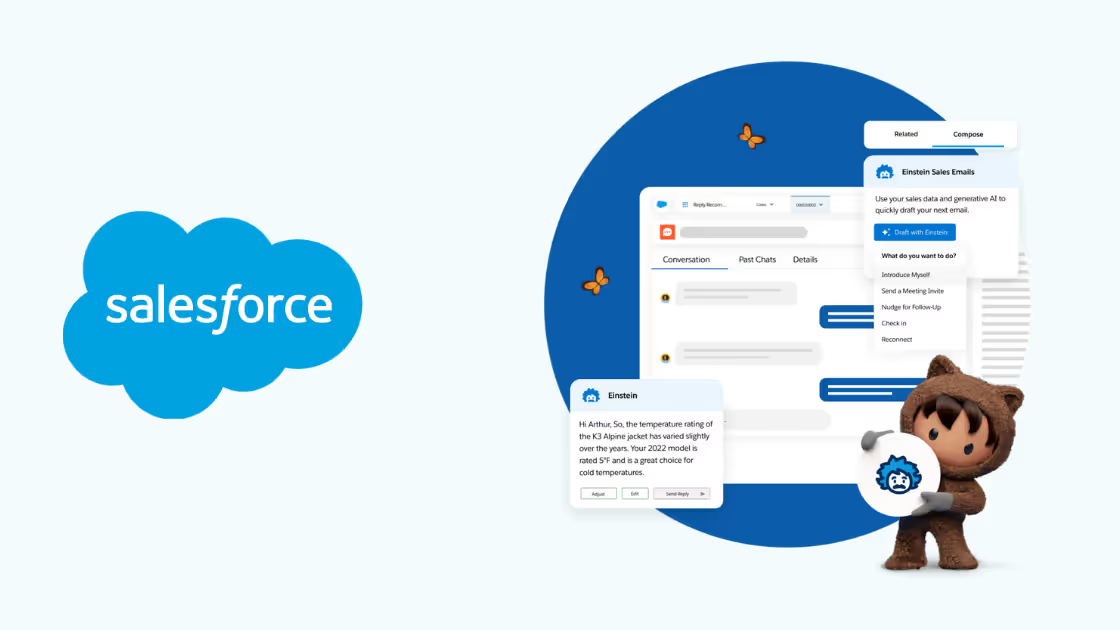
Salesforce Einstein is an AI-powered suite integrated within the Salesforce platform that offers predictive insights, recommendations, and automation.
Einstein uses machine learning algorithms to analyze data from various sources to provide personalized insights, automate tasks, and predict outcomes, enabling reps to make data-driven decisions. AI enhances Salesforce Einstein by enabling it to continuously learn from data, improving accuracy and efficiency over time.
For sales leaders, Einstein can help solve challenges related to a number of sales activities, including sales forecasting, lead prioritization, and customer engagement, streamlining sales workflows and boosting productivity.
Pricing: $500/user/month
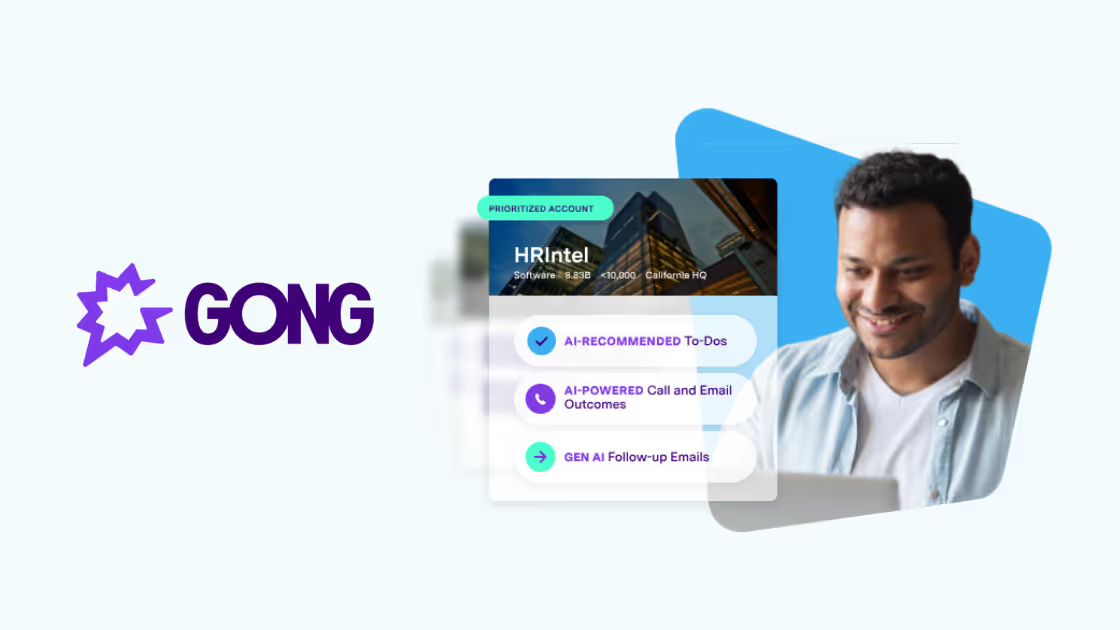
Gong is a sales conversation analytics platform that now employs AI to analyze sales calls and meetings.
Using natural language processing and machine learning, Gong transcribes and analyzes conversations, extracting insights based on customer sentiment, objections, and key topics discussed.
AI enhances Gong by swiftly processing reams of data, identifying trends, and providing actionable recommendations to improve sales strategies. For AEs, Gong solves challenges related to understanding customer needs, refining pitch strategies, and enhancing overall communication skills — adding up to more effective sales outcomes.
Pricing: contact Gong for pricing
Thinking about adding Gong to your sales tech stack? Consider bundling Gong and LeadIQ together to get the power of both platforms at one unbeatable price.
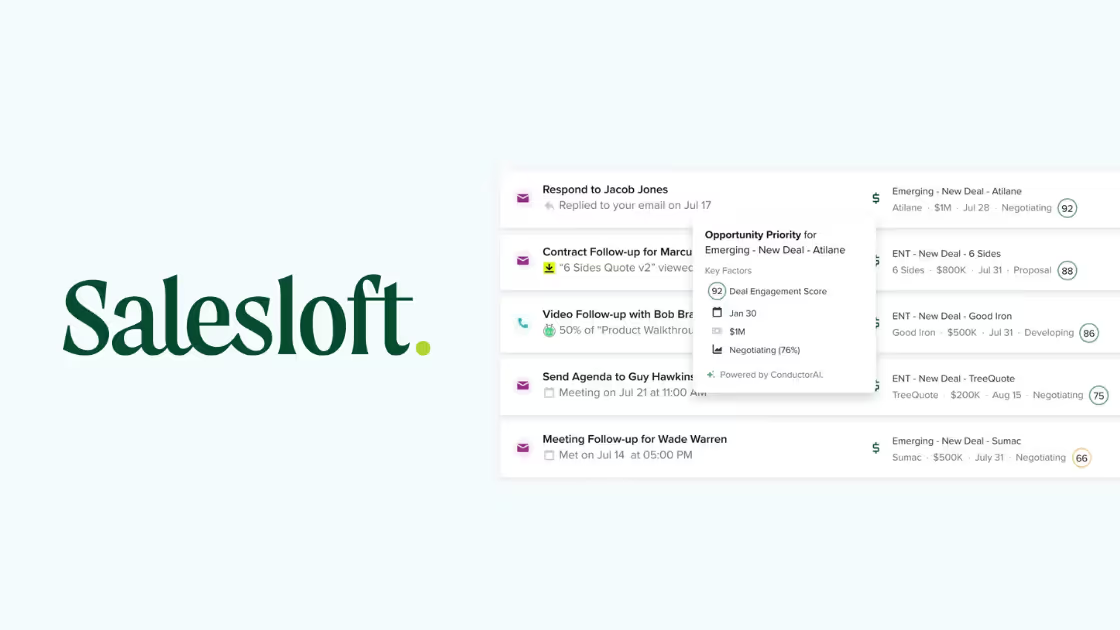
Salesloft is a sales engagement platform that helps teams automate and optimize communication with prospects and customers alike.
Salesloft uses AI for predictive analytics, personalization, and workflow automation. LeadIQ recently unveiled an integration with Salesloft Rhythm, an AI-driven signal-to-action engine that brings buyer behaviors directly into AE workflows and recommends actions.
AI enhances Salesloft by analyzing data patterns to predict the best times to reach out, personalize messaging, and automate repetitive tasks — like when to send follow-up emails. For AEs, this solves lead prioritization challenges while improving response rates and enabling them to scale their outreach efforts seamlessly, boosting productivity and increasing win rates.
Pricing: contact Salesloft for pricing
HubSpot is an all-in-one customer relationship management, marketing automation, and sales platform.
They advertise their AI sales tools as "HubSpot Breeze" and offer predictive lead scoring, forecasting, conversation intelligence, and email generation. Specifically for sales teams, they feature "Breeze Prospecting Agent" and with their recent acquisition of Clearbit, they are now offering "Breeze Intelligence" for data enrichment and buyer intent data.
AI enhances HubSpot by automating repetitive tasks, personalizing user experiences, and providing data-driven insights. This simplifies lead management while enabling AEs to prospect more efficiently and engage customers more effectively with highly targeted outreach and at-a-glance visibility into the highest-value leads.
Pricing: Depends on AI sales tools utilized - contact Hubspot for pricing

LeadIQ Scribe is a generative AI writing tool for sales reps and AEs to compose personalized messages in just a few clicks.
With LeadIQ Scribe, users can add prospects from Gmail, Salesloft, Outreach, or the LeadIQ web app, pick a value prop, and select personalized insights based on LinkedIn activity, education, current events, and more. The AI technology then whips up three personal email drafts, and the sales team member chooses which one to tweak or fire off as is. Think of Scribe as an email generation automation tool.
We also compared LeadIQ Scribe vs ChatGPT for writing personalized sales content... let's just say we think Scribe is the clear winner.
AI enhances LeadIQ Scribe by continuously learning with each draft; AEs can give a thumbs up on drafts they like and a thumbs down when the tool could have done better. LeadIQ Scribe also learns from open rates and response rates, helping AEs get increasingly better outcomes over time. Add it all up, and LeadIQ Scribe helps AEs eliminate writer’s block, reclaim tons of time, and engage more prospects more effectively at scale.
Coupled with our platform’s high-quality contact information, Scribe’s AI-generated emails help sales teams accelerate revenue growth by helping reps engage qualified leads more effectively.
Pricing: Starts at $0/user/month
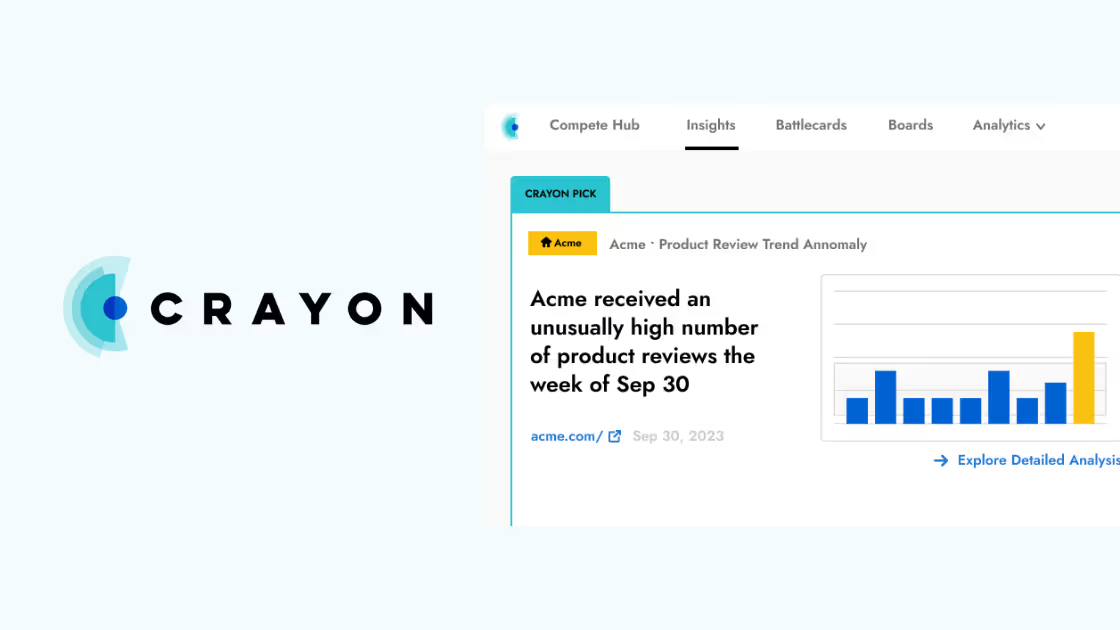
Crayon is a market and competitive intelligence platform that helps businesses track competitors and keep pace with industry trends and market changes.
Crayon uses AI to gather, analyze, and summarize data from various sources, including websites, social media, and news articles. Crayon recently launched Sparks, what they call the industry's first and only AI-research tool.
AI enhances Crayon by rapidly processing vast amounts of information, identifying key insights using natural language processing, classifying data into categories, scoring intelligence using machine learning, and providing actionable recommendations. This helps AEs understand market dynamics, competitive positioning, and customer preferences more effectively, which enables them to craft strategies that help them stay ahead of the competition.
Pricing: contact Crayon for pricing
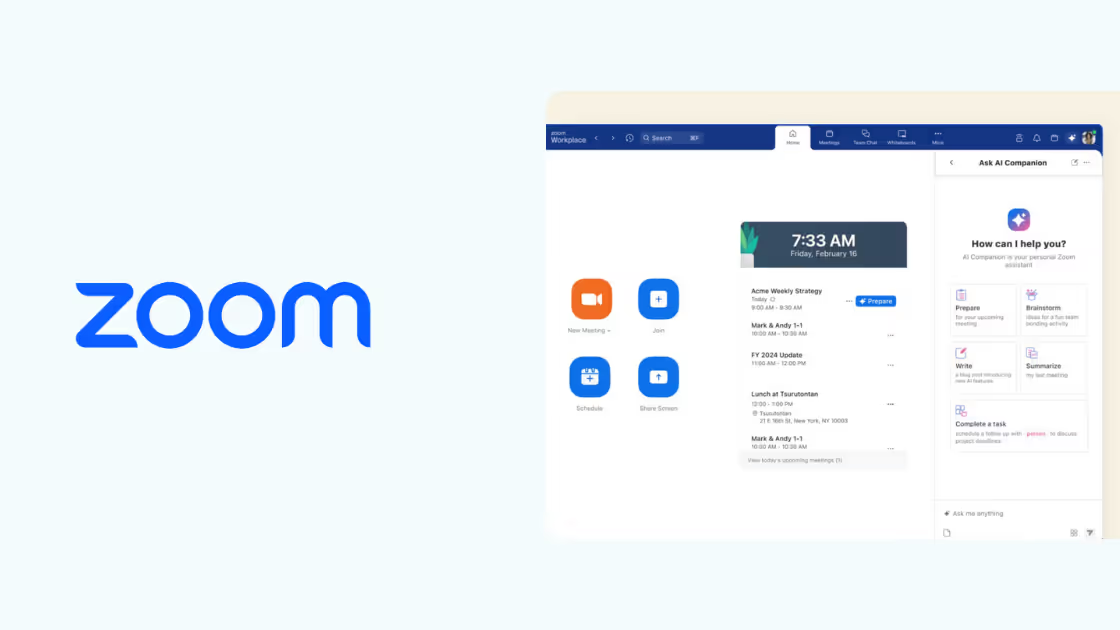
Zoom is a cloud-based video conferencing solution used to facilitate virtual meetings, host webinars, and collaborate.
Zoom uses AI for features like noise cancellation, background blurring, and transcription services. The platform also offers their Zoom AI Companion that drafts emails and chat messages and summarizes meeting transcripts.
AI enhances Zoom by improving the user experience, helping folks have more productive meetings, and allowing users to quickly digest the contents of a meeting in short order. For AEs, Zoom is life-saving sales software by delivering a seamless virtual meeting environment, making it easier to engage prospects wherever they are.
Pricing: Starts at $13.32/user/month
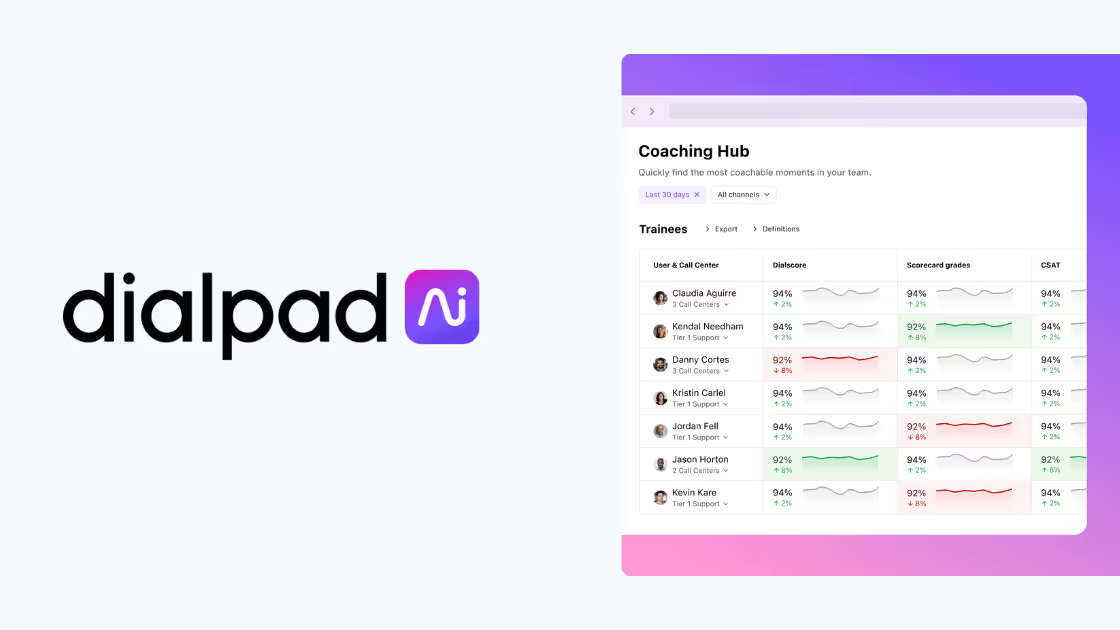
Dialpad makes AI-powered customer engagement, sales intelligence, and collaboration solutions.
The company’s AI Sales Center product provides coaching, sales guidance, and QA tools, all powered by AI. Using artificial intelligence, Dialpad users can ensure sales professionals are adhering to playbooks, immediately identify areas for improvement, and automatically score every conversation against the most important metrics.
AI enhances Dialpad by automatically transcribing calls, ensuring 100% of customer interactions are graded, and giving sales leaders the data they need to identify coaching opportunities and where additional resources might be needed — all in real time.
For AEs, this makes it easier to handle high call volumes, capture important details during conversations, and ultimately have more productive customer interactions. At the same time, the platform helps sales teams prioritize leads, understand customer sentiments, and adjust their approach accordingly — leading to better business outcomes.
Pricing: starts at $95/user/month
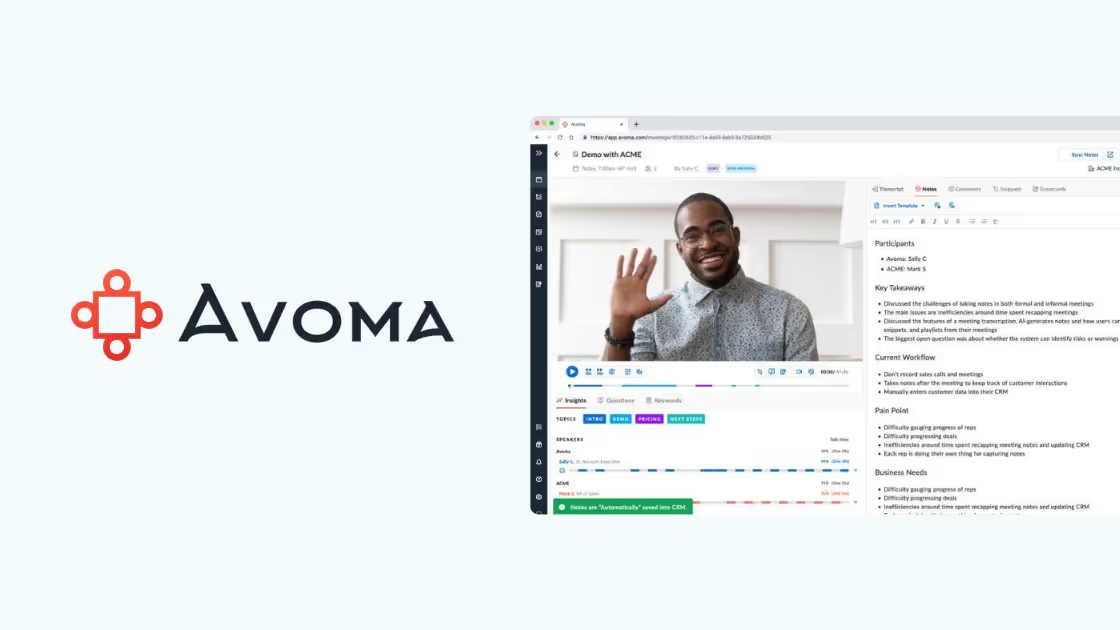
Avoma is an AI-powered meeting assistant and conversation intelligence platform that helps sales teams capture, transcribe, and analyze meetings.
Avoma uses AI for tasks like speech recognition, topic extraction, and sentiment analysis, among other things.
AI enhances Avoma by automating note-taking, summarizing key points, and identifying action items from meetings rapidly. For AEs, this solves the challenges associated with retaining and organizing meeting information, allowing them to spend more time engaging with prospects and driving sales.
Pricing: Starts at $0/user/month

6Sense is an account-based marketing platform that aims to help sales teams identify and engage with potential buyers at the right time.
It uses AI for predictive analytics, intent monitoring, and personalized content recommendations.
AI enhances 6Sense by analyzing large amounts of data to predict buying intent, prioritize leads, and personalize messaging. For AEs, this makes tasks like lead qualification, pipeline management, and targeting simpler thanks to actionable insights into prospect behavior and preferences, which improves sales effectiveness.
Pricing: contact 6Sense for pricing - contracts are based on company size, number of users, features, and credits.
Every sales team and executive leadership wants to close deals faster, automate repetitive manual tasks, and increase productivity however they can. But how can you be sure that a new AI tool that you’ve implemented really helped you cover more ground?
Answering this question can be more difficult than most teams and sales leaders care to admit. When teams adopt new tools, they often only have a short time to evaluate its efficacy before having to convince leadership to pay for it.
Even worse, it’s unfortunately common practice for sales leadership to force a lackluster AI sales tool on the team and expect them to use it even if it’s the wrong tool for the job.
If you’re considering implementing any of the AI sales tools in this piece into your workflows, here are some steps to follow as you evaluate their effectiveness.
AI sales tools come in all shapes and sizes. When it comes to determining whether a solution is right for your team, you first need to ask yourself exactly what you’re trying to accomplish with it.
Do you want to close deals faster? Are you trying to write better cold email sequences? Is your top priority automating repetitive tasks? By clearly defining what you hope to achieve with the new tool, you can evaluate the current state, set your baseline, and measure your effectiveness from there.
While new sales tools and tech gadgets can be a shiny new object, the first step to understanding whether they’re actually helping is to learn whether the team is actually using them. You might deploy the best AI sales tool the world has ever seen, but if your team isn’t using it regularly, what good does that do?
Once you understand what you hope to accomplish with a new tool, it’s time to assess the tool’s usability to determine whether it truly supports sales enablement and solves pain points. Does it take a lot of effort? Is there a steep learning curve? Does the tool require AEs to overhaul their entire workflows or does it act more like an AI sales assistant, tightly integrating into their existing processes? Does the tool deliver a strong user experience or is it buggy and unreliable?
By answering these types of questions, you can start to evaluate whether a specific AI sales tool is really the right fit for your team.
After 30 to 90 days of using a new AI sales tool, you can both qualitatively and quantitatively measure sales performance metrics from the baseline you defined in step one. (You might need more time if your sales cycle is longer.)
But those metrics aren’t the only data point you should use. The numbers might not be up yet, but your team might be loving the tool and may agree that it’s super beneficial to their prospecting workflows. If that’s the case, you might want to be a bit patient and give the tool more time to work its magic. Any tool that increases engagement and makes life easier can still be incredibly valuable.
As every seller knows all too well, there are only so many hours in the day. With more and more responsibilities to manage and more and more companies competing for attention, teams and leadership need to do everything they can to work more efficiently and effectively every day.
This is one area where AI-powered tools can be a true game-changer. By adding the right AI sales tools to your sales tech stack, you can engage more prospects in less time, while connecting with them on a truly personalized level.
When you’re ready to see what this looks like in practice, connect with our sales team to learn more about how you can compose personalized emails in seconds using LeadIQ Scribe.